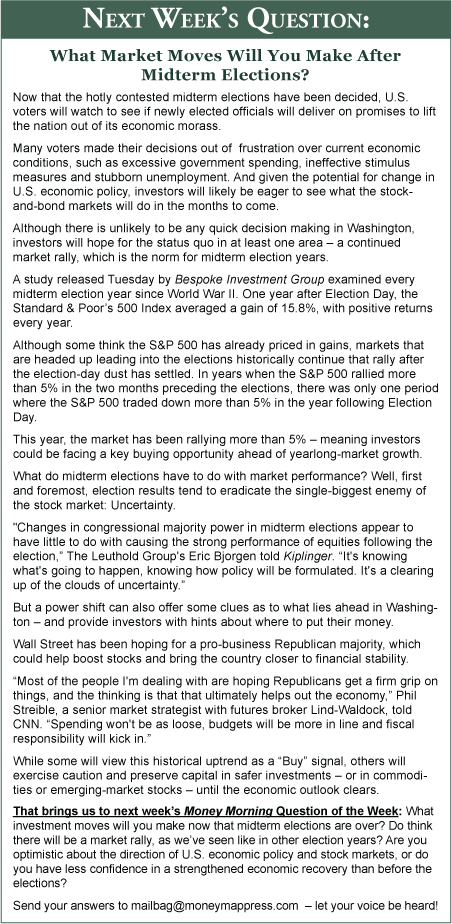A tense Congressional tug-of-war carried on before midterm elections this week as Republicans and Democrats fiercely campaigned for seats in the U.S. House of Representatives and Senate.
This Republican-Democrat contest was the hottest in years as voters debated over which candidates would be the most likely to lift the United States out of a morass marked by near-double-digit unemployment, sluggish economic growth and a terrifying $1.29 trillion budget deficit.
Although Republicans were poised to take control of Congress, a significant number of seats remained vulnerable until the very end.
"Let me tell you something," U.S. Vice President Joe Biden wrote last week. "I've been around campaigns for a long time and I have never seen a midterm election with this many races in play."
Experts described this campaign season as more volatile than most because of a possible major shift in power.
Experts predicted the GOP would easily nab some seats in industrial states, where the recessionary fallout has turned voters against Democratic incumbents.
"The political climate is dominated by the economy," Nathan Gonzales, who tracks state races for the Rothenberg Political Report, told Bloomberg. "That's where Democrats are getting hurt."
Republicans successfully attracted voters by criticizing the U.S. economic malaise, including:
- An economic growth rate that's stumbled from 5% at the end of last year to a wheezing 1.7% in the second quarter.
- U.S. President Barack Obama's continued spending, such as a $787 billion economic stimulus package and $940 billion in healthcare reform.
- A 9.6% unemployment rate that won't budge.
Voters have also criticized financial bailouts that will end up hitting already struggling taxpayers.
Other concerns left for after the elections include the Bush tax cuts, a stagnant housing market and ongoing energy issues like offshore drilling.
One thing is clear: Whomever voters elect could be the controlling voice that gets to stop the political deadlock and move the country forward. While some experts have said that a divided government could force negotiations and cooperation, that has so far not been the case.
"We need to have a more thoughtful, nuanced discussion about what we're going to do and what exactly does this mean," David Cote, a member of President Obama's debt-reduction commission, told The New York Times. "And I don't see that happening. It seems like everybody wants to just argue."
The intense focus on the midterm elections and the possible change they could bring to Washington prompted last week's installment of the Money Morning "Question of the Week": What top three issues do you want to see addressed after the midterm elections? Are you confident these issues can and will be fixed? Do you think the vote will bring about a major power shift in Washington? Do you see positive change on the U.S. political horizon, or are you skeptical over what the future holds?
Bring On Change: Top Three Issues To Address After Midterm Elections
1. Scrap the tax code. Try the Fair Tax for at least five years or enact a much simpler code so Americans and American businesses will save billions just on tax preparation. The current code is too complicated, biased, and an undue burden to comply with.
2. Scrap the new financial regulations, try again and re-enact the Glass-Steagall Act. Take the banksters to court for fraud.
3. Limit the length and number of issues that are addressed in any new legislation, plus it must be read cover to cover.
- Kathy L.
1. Term limits.
2. Tort reform.
3. Balanced budget amendment.
- "Pegasus"
1. Job creation
2. Reduce national debt
3. National security
- Johnson M.
1. High unemployment.
2. The huge debt President Obama put us in.
3. Winning in the Middle East.
- Christopher P.

If by "after the elections" you mean the lame duck session, I hope they accomplish nothing! I am terrified that there will be a lot of lame ducks who have nothing to lose, who then decide to push through a lot of harmful legislation before they move on to their jobs with the lobbyists and legal firms in Washington and New York. Sort of padding their nests before they take their new jobs.
However, once the new Congress convenes in January, I think that the first order of business will be to extend the Bush tax cuts, most likely for everyone. President Obama will protest, but will then sign the extension, rather than hit everyone with a big increase.
The second order of business needs to be a complete and thorough audit of the Federal Reserve. The evidence of corruption and protecting the banks and Wall Street at the expense of the general public has become far too blatant to ignore. Especially the Fed's contention that inflation is too low (!!) and their plans to monetize trillions in federal debt in an attempt to increase inflation is absolutely absurd! It is far past time for a thorough and open airing of the stinky stuff going on behind their closed doors.
As for a third priority, it is a target-rich environment, but what certainly needs to be avoided is any increase on the regulatory burden on small businesses. Elimination of the 1099 for every business that you do $600 worth of business with should certainly be on the list, as should the elimination of a lot of federal bureaucracies, but I doubt that this will get any play time at all. I have faint hopes that some of the new Tea Party candidates will push through some helpful changes, but I fear (and expect) that most of them will find themselves captured by the system, or if they refuse to be captured, they will almost certainly be stymied and sidelined.
I wish I could be more optimistic, but I see neither the will nor the good will that would be necessary to make real improvements in Washington.
- Gordon F.
1. What can be done to promote good paying jobs - probably manufacturing back to the U.S.? Working people are our customers and if they aren't employed, they can't buy!
2. Get us out of the war business; we are spending all the nation's capital there, leaving none for maintaining and improving the country.
3. We need to push for steps to reduce damage to the environment not only here but also throughout the world. It doesn't matter how much money you have, you can only escape the environmental damage for a while before even your far off unpolluted hideaway will also be afflicted!
- DP
First of all, if the U.S. wants to return to a position of possibly surviving as a first world nation, we need to:
1. Lance our abscessed military and let the polluted elements drain out of it. The overall military budget is bloated to a ghastly degree-at least 100% larger than it needs to be. It mainly exists at this super-inflated level to enforce the U.S. corporate-run economic empire globally. Anybody in his or her right mind should recognize this. All told, the U.S. is spending 52% of the federal budget on war and defense (you can't throw in Social Security, it's not part of the same budget, folks!). So start by knocking down the military by 50% in 10 years.
2. We need to develop a real health care system, not this horribly ineffective and phony ‘health care system' which is really a sickness care and pharmaceutical (drug) supply system, masquerading as ‘health care.' It only serves to allow people to get very sick, and then make money off of them without health-producing (wellness) ability and emphasis. Americans are some of the most unhealthy people on earth although we spend multiples of what other much more healthy people are spending.
3. We need campaign finance reform - public elections!
There you go - the three biggest things we should do to advance this country's welfare. Alternative energy and clean nuclear might be a fourth.
- "Mr. Thinking Ahead"
1. End the wars - or work with North Atlantic Treaty Organization (NATO) more. We cannot afford war. No nation can afford the number of wars that we've helped finance especially the two current wars.
2. Reduce government by 25% - 35% to year 2000 levels. Almost all government agencies have failed their mission statement. The government cannot grow quicker than its populace.
3. Set term limits for all legislative bodies, three terms and you are out.
-Terry T.
1. Audit the Federal Reserve and banks (and close them as necessary).
2. Stop craziness on federal spending (includes cutting military, too!).
3. Reduce taxes on small business owners/middle class and increase it on those with incomes not over $250,000, but more like $2 million (remember how taxes were before the 1930s?).
- Constantino R.
1. Deficit reduction and economic growth - massive cuts in most federal spending and government bureaucracy (especially in education, energy, and environment); repeal Obamacare; institute Tobin Tax on Wall Street fat cats; reduce regulation, red tape, and taxation of individuals and small businesses; fix Social Security and Medicare (eliminate wage base taxation cap, limit entitlement growth, further increase retirement age); reduce dependence on foreign oil (use natural gas and nuclear energy).
2. National security and secure borders - grow defense and counter-terrorism budget; control borders and ports of entry; no wholesale amnesty for illegal immigrants without corresponding commitments on their part; stop/reverse social agendas for the military; re-institute/increase strategic stockpiles of important commodities; again, reduce dependence on foreign oil (use natural gas and nuclear energy).
3. Individual freedom and social issues - preserve the U.S. Constitution, our founding principles, religious freedom, free speech, and traditional family values; rein in judicial activism (pass legislation to prevent any overrides of popular votes, except by new referendum); reduce dependency on government and encourage greater charitable activity (tax credit versus tax deduction); support individual and family responsibility (moral and economic).
- "alpha phox"
[Editor's Note: Thanks to all who responded to last week's "Question of the Week" feature regarding midterm elections. Be sure to answer next week's question: What investment moves will you make now that midterm elections are over? Do you think there will be a market rally, as we've seen like in other election years? Are you optimistic about the direction of U.S. economic policy and stock markets, or do you have less confidence in a strengthened economic recovery than before the elections?
Send your answers to [email protected].!
Is there a topic you want to see covered as a "Question of the Week" feature? Then let us know by e-mailing Money Morning at [email protected]. Make sure to reference "question of the week suggestion" in the subject line. We reserve the right to edit responses for length, grammar and clarity.
Thanks to everyone who took the time to participate - via e-mail or by posting their comments directly on the Money Morning Web site.]
News and Related Story Links:
- Money Morning News Archive:
Midterm Elections Stories
- The Wall Street Journal:
Story of the Midterms, Told Through 5 Races
- Bloomberg:
Voters ‘Ripe for Change' Signal Republicans to Add 6 Governors
- The New York Times:
Deficit Divisions Likely to Grow After Elections
- Money Morning:
Will Midterm Elections Ignite a Stock Market Rally?
- Money Morning:
Voters Frustrated With U.S. Economy Turn to Republicans in Midterm Elections
- Money Morning:
Money Morning Mailbag: How the Demise of Glass-Steagall Helped Spawn the Credit Crisis
- Money Morning News Archive:
Question of the Week Feature



